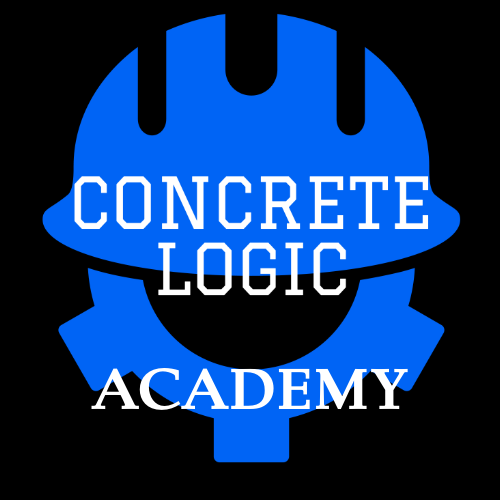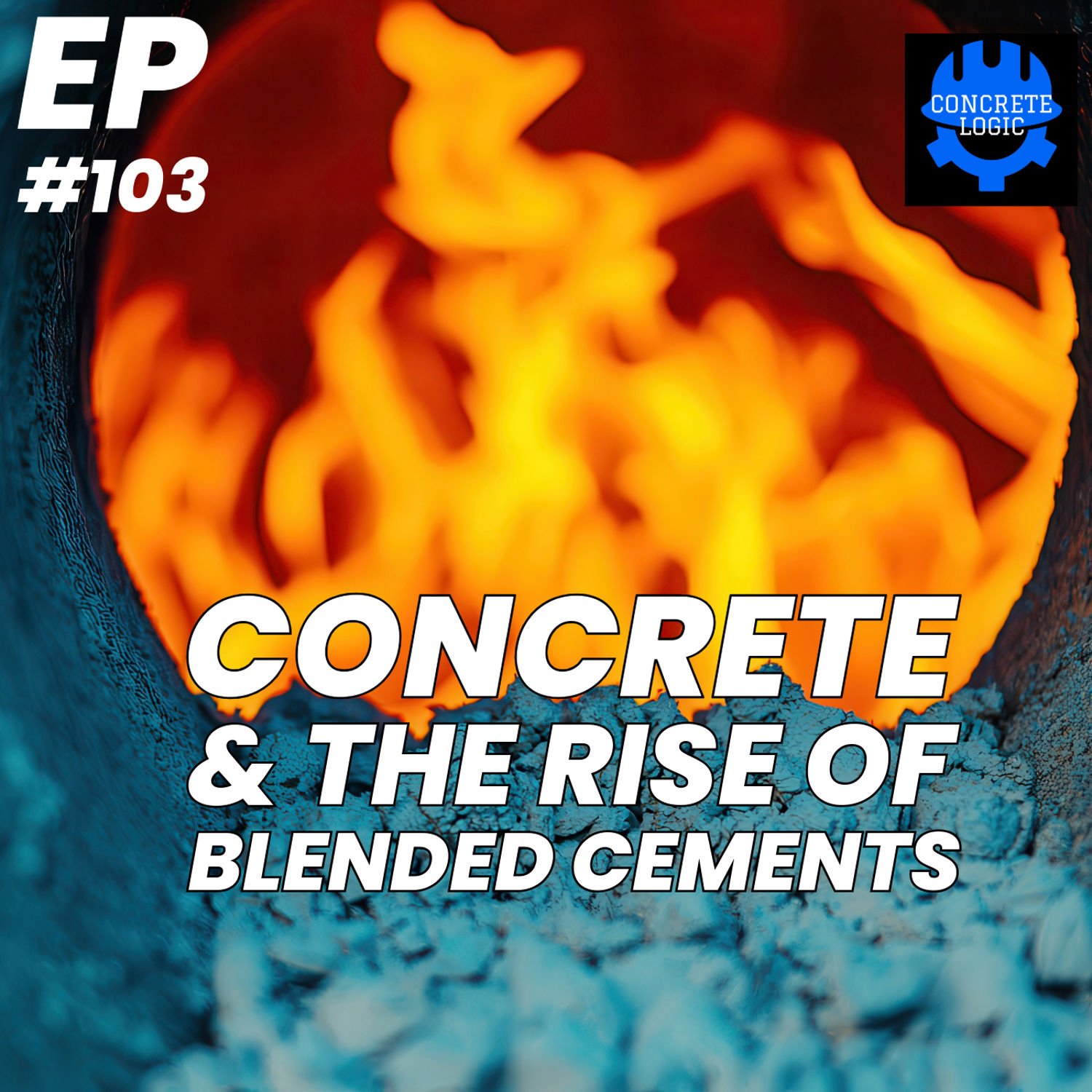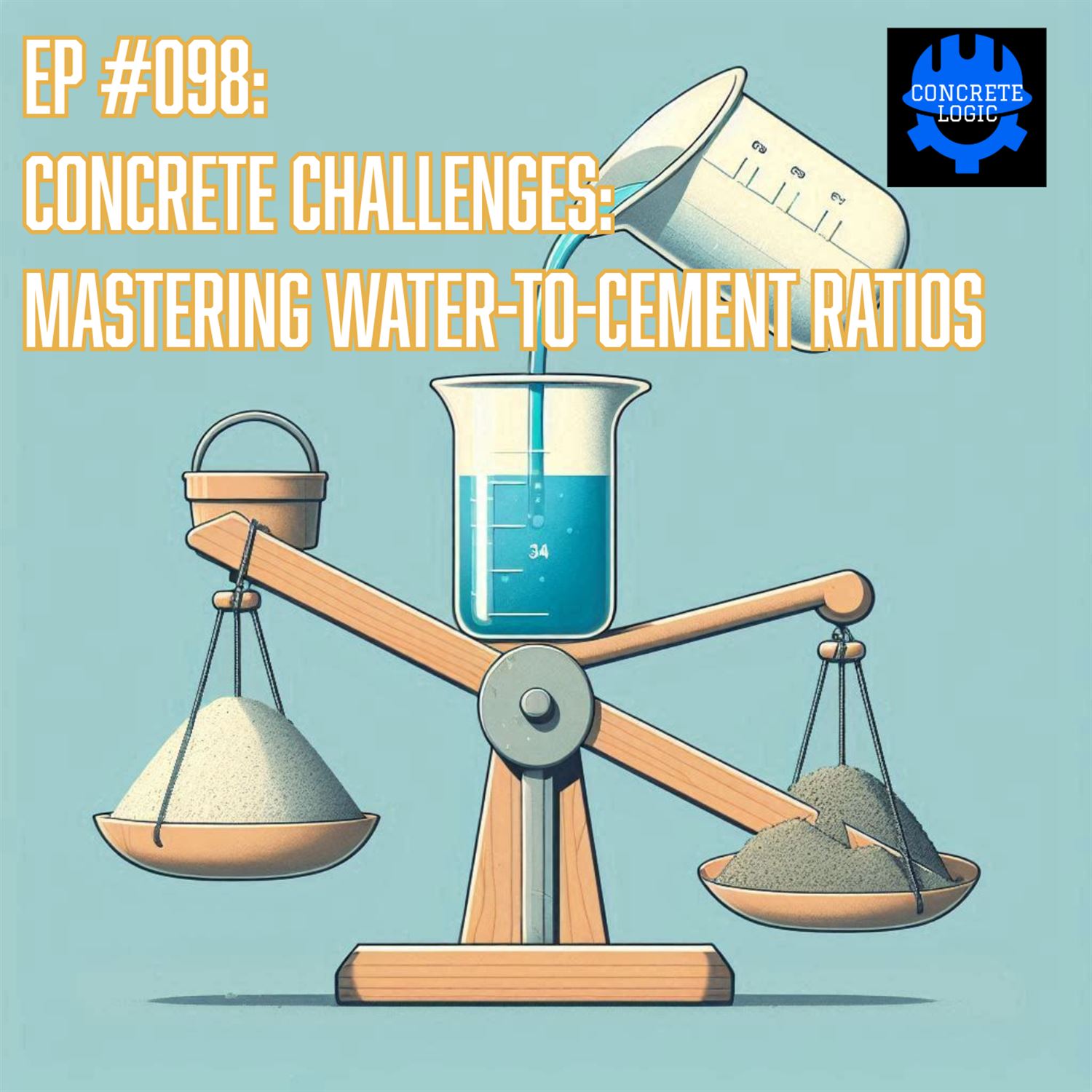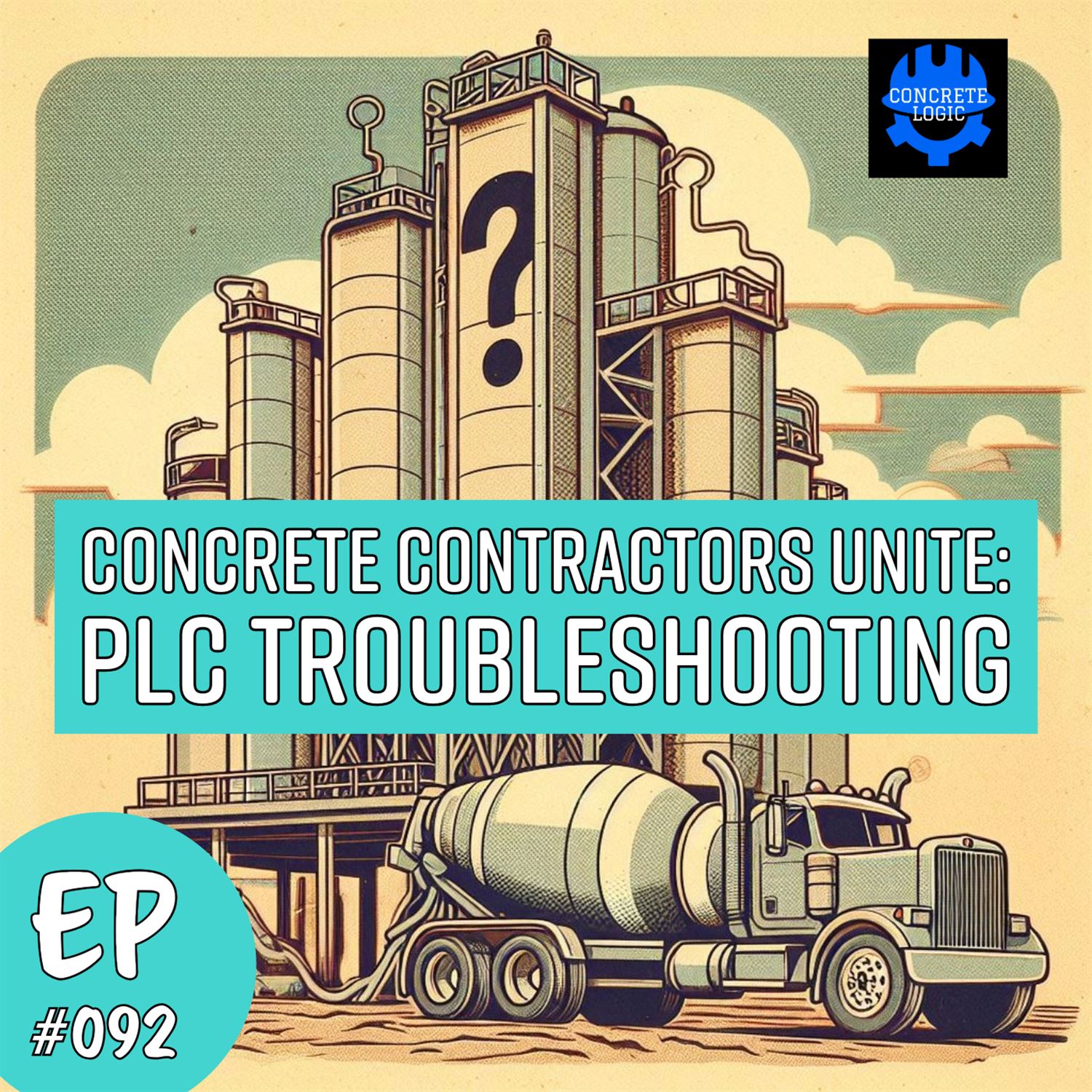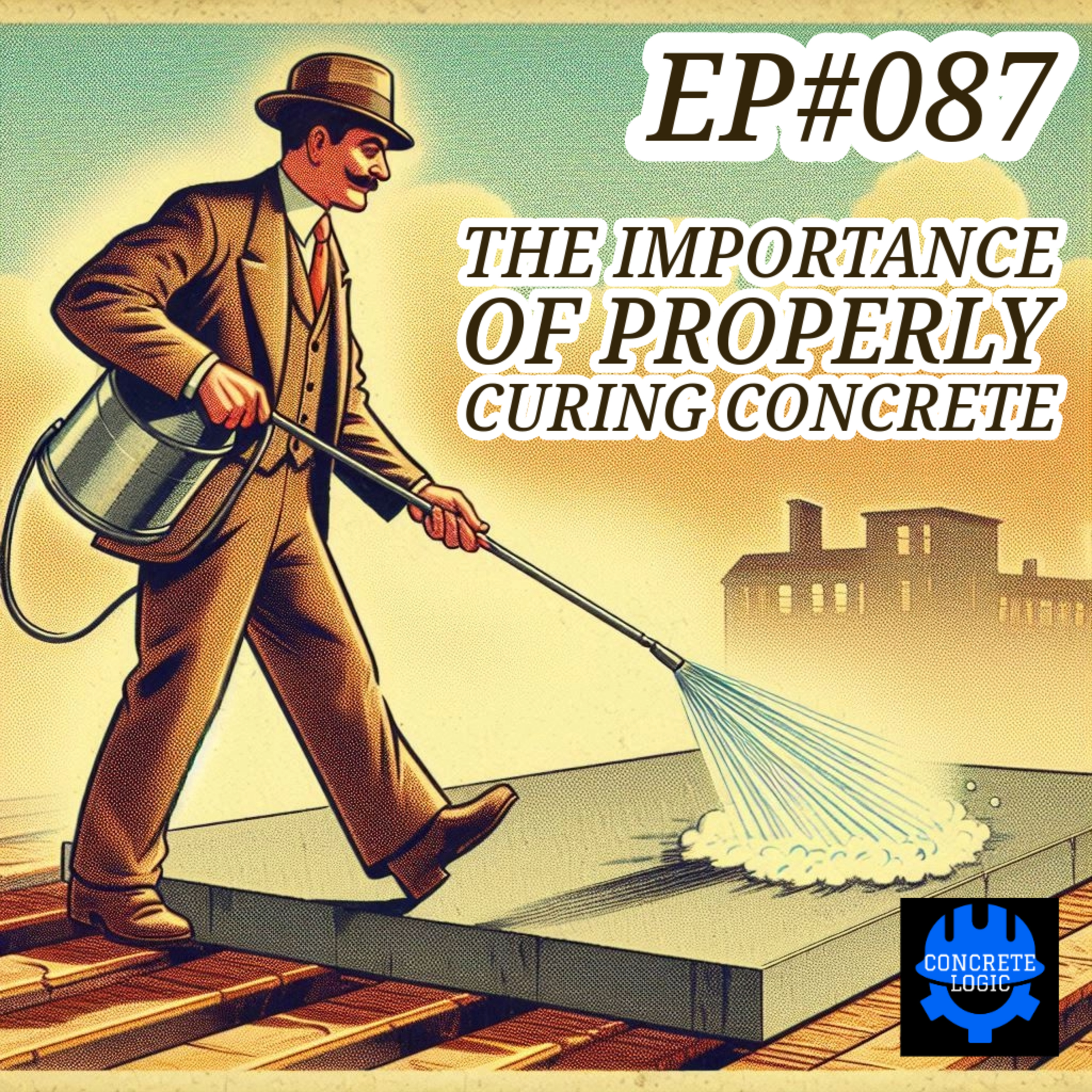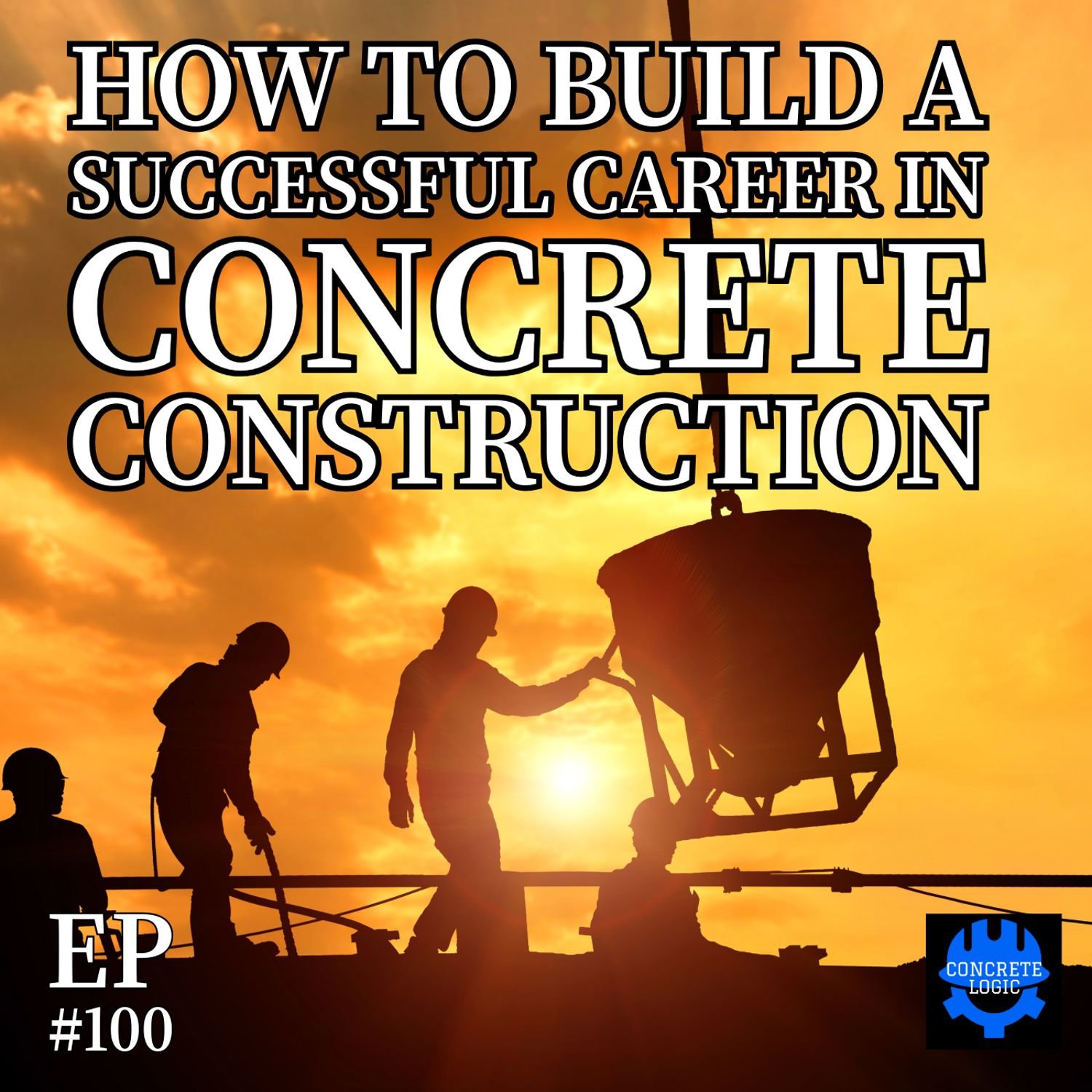
EP #100: How to Build a Successful Career in Concrete Construction

In this episode of the Concrete Logic Podcast, Seth interviews Richard Williams, Senior Director of Talent for Baker Construction. They discuss the importance of hands-on experience in concrete careers, the growing demand for professionals in the industry, and the impact of technological innovations. Richard shares insights on career paths available in concrete construction and emphasizes the value of field experience in shaping successful careers.
Takeaways
- Hands-on experience is crucial for success in concrete careers.
- Internships provide valuable insights into career preferences.
- The demand for concrete professionals is significantly increasing.
- Technological advancements are enhancing productivity in construction.
- Field experience fosters respect and strong relationships in the industry.
- Certifications are beneficial, but practical experience is essential.
- Career paths in concrete construction are diverse and flexible.
- The construction industry is dynamic, with daily challenges and innovations.
- Networking through local chapters and competitions can enhance career prospects.
- Field experience contributes to effective leadership and team development.
Chapters
00:00 Introduction to Concrete Careers
03:01 The Importance of Hands-On Experience
12:10 Growing Demand for Concrete Professionals
16:04 Technological Innovations in Concrete Construction
20:50 Career Paths in Concrete Construction
27:54 Reflections on Field Experience and Career Growth
***
Did you learn something from this episode? Would you like to support the concrete industry's favorite podcast?
If so, donate at https://www.concretelogicpodcast.com/support/ .
When YOU donate to the show, you will be listed as a producer of the next episode that is released!
***
Episode References
Guest: Richard Williams | Baker Construction | Williamsrgf@bakerconcrete.com
Guest Website: https://bakerconstruction.com
Guest LinkedIn: https://www.linkedin.com/in/richardgwilliams1/
Producers: Dan McCoy, Jodi Tandett, Nick Sonnentag
Donate & Become a Producer: https://www.concretelogicpodcast.com/support/
Music: Mike Dunton | https://www.mikeduntonmusic.com | mikeduntonmusic@gmail.com | Instagram @Mike_Dunton
Host: Seth Tandett, seth@concretelogicpodcast.com
Host LinkedIn: https://www.linkedin.com/in/seth-tandett/
Website: https://www.concretelogicpodcast.com/
LinkedIn: https://www.linkedin.com/company/concrete-logic-podcast
Seth (00:02.036)
Welcome to another episode of the Concrete Logic Podcast. And today I have a special guest, Richard Williams, Senior Director of Talent for the Eastern US for Baker Construction. I didn't say concrete. got it right. Inside joke. So yeah, so Richard is the first Baker employee, current employee to come on the podcast. So I'm excited to have him today and we're going to talk.
a little bit about concrete careers. We're going to continue. I don't know if you listen back. We've done a couple episodes of answering questions from Virginia Tech students. We're going to continue that today. Richard's going to handle some of those questions for me. But before we get started, just remind everybody how you can support the podcast. There are three things you can do. The first thing is, if you enjoy this episode, please
Share it with a colleague or a co -worker The second thing you can do is if you go to concrete logic podcast comm There are two ways you can get a hold of me. There's a link that says contact and on the top of the page if you click that It's like sending me an email or you can at the bottom right hand of that same homepage There's a little microphone if you click that that's like sending me a voicemail
And what I'm looking for our topic or guest suggestions for the show, because I want to put, episodes out that you want to hear. so please do that. And then the third thing is, on the same homepage, if you feel like you get some value out of this episode or any of the, episodes and we're, we, by the time this comes out, we're over a hundred episodes. So if you, if you listen to the past episode and you're like, man, I really got some value out of that. want to give some money.
to the show, there's a donate button on the homepage. You click donate and you can give any amount. Any amount is appreciated. And then when you do donate, you are listed as a producer. you know, I don't know if you pay attention when you're watching a movie, there's in the credits, there's a producer. So you're listed as a producer of the Concrete Logic podcast. So that's what you get when you donate to the show.
Seth (02:25.428)
With that, Richard, who, by the way, I think has the best radio voice of all Baker employees. this, think you're perfect for podcasting, Richard.
Richard Williams (02:36.238)
Thank you. Thank you. First, I wanted to congratulate you on over, you said over 100 episodes or getting close to 100 episodes. I remember when you first got this started and then what you're doing for the concrete construction industry is huge. And so I just want to congratulate you on over 100 episodes. Huge, huge, huge feed.
Seth (03:02.343)
thank you. Appreciate that.
Seth (03:06.622)
Yeah, so Richard is the, as I mentioned before, he's the senior director of talent for Baker. And we have some questions here from Virginia Tech students that were sent to us in the spring. So we're going to continue that, answering these questions as best as we can.
And hopefully these will be helpful for folks that are looking at concrete construction as a career. So Richard, let's go ahead and get right into these questions. So the first question I have here for you is how important is hands -on experience in concrete construction careers and what are some ways a fresh graduate can gain practical skills and knowledge in this field?
Richard Williams (04:04.184)
So I think it is paramount, right? As I view this, we look at what we call like a dual degree, right? One that we're getting from college and then one in the trenches, right? In the actual field. And so for our co -ops and interns, we like to bring people in and give them hands -on training, right? It truly develops better leaders overall.
And what I mean by that is as a concrete subcontractor, for example, what we would do is have you come in as a working in the field with the carpenters, with the laborers, then moving on to another rotation, which may be in field engineering, line and grid layout. Another one is supporting the project engineers.
maybe pre -construction and then working in the concrete itself, right? So actually being a finisher and not that you're gonna be proficient at everything that you do there, but it gives you a better understanding pillars that support our business. It gives you a better understanding of what we do. It gives you a better understanding of our business and what real life would look like. And so while we get the college degree,
and that's important, it's also equally important that we have a degree in the field, right? Where we are earning the respect of the folks that work with us and for us on a daily basis, understanding that we can't lead men and women later on until we understand truly what they do and are willing to do and be in that same seat with them. So I think it is truly important and equally important
that we get both field experience and the college experience.
Seth (06:07.784)
Yeah. Can you, can you talk a little bit about your own personal experience with that? Like, you know, as you.
Richard Williams (06:13.454)
Yeah, so for me, I started off in Houston, Texas with Baker in the year 2000, so 24 years ago. And immediately I was put into the field. I was put in as a carpenter and worked as a carpenter on the embed crew during the Reliant Stadium in Houston, Texas, and worked on that for three months.
the experience that I gained there from learning to read plans, because I studied civil engineering in school, but learning to read plans, learning to understand how the building actually came together, what we needed to do from excavation and foundation perspective, understanding how to make sure the building was plumb and on grade and level. It was just...
bringing all of that together for me was tremendous knowledge. But I tell you this, one of the most important things that I gained out of that was the respect for my coworkers. The work that these guys and girls put in every day is tremendous. It is beyond belief. So for me, never worked in concrete construction before, being put into this and kind of thrown in.
Like, hey, yeah, you're a part of the team. You're not going to be shadowing anyone. You're going to be in the crew working alongside these guys, understanding the form systems, understanding what we need to do and how we actually place this for success, how to be efficient. It really, really brought a ton of value. But going back to the respect of the guys, those are relationships that I forged 20, 24 years ago that are still with me today.
And now that I am in a leadership position, a lot of these folks that I worked with 20, 24 years ago who have also grown, we have forged such strong bonds and relationships because I was there with them that it's easier to lead later on when you come back and ask these folks to follow you. So this is tremendous for me and I believe in this program of
Richard Williams (08:40.418)
hands -on training for those reasons.
Seth (08:44.596)
Yeah. And it's the, this, most of the schools that we, recruit from, I think it's mandatory for them to do some kind of internship and, and while they're going to school. So I think, if, if, if your school, I'm talking to the audience out there, if you're at a school right now, that is, it isn't mandatory to do an internship. You should make it mandatory for yourself to get that.
hands -on experience because you're going to be ahead of your fellow students when you guys graduate. Would it be fair to say, Richard, from a student that say graduate with no hands -on experience whatsoever during their college career versus a student that graduated as well but intermixed into that college career?
took the time to do some internships as well. If you were comparing those two students.
Richard Williams (09:45.464)
Yeah, think it's leap and bounce, right? Away from someone who does the actual hands -on during your time in college and where you come in and do an internship or a co -op. A co -op is an extended internship. And so it's not a summer. You work from summer all the way through winter and then start back in the spring. But not only that, but it gives you a sense of
Seth (09:48.853)
Mm
Richard Williams (10:14.092)
what you want. So for me, doing civil engineering, I was thinking I was going to go to design. And so I joined the company and within the first three weeks, my first internship, I knew I couldn't do this, right? Design was not for me. I couldn't sit behind the computer every day. I wanted to be out there. I wanted to see things that were tangible, things that I could see walk away every day knowing that something else tangible was put in place today that I contributed to.
Right? So after three weeks of doing that first internship in design, it was clear to me that that was not the path that I thought it to be. Right? So I was heading on the path of design. And until I started my construction career as an intern is when it all came to me and I was like, yes, this is where I need to be. This is what I need to end up doing.
I wouldn't have had that experience if I had gone through college and then waited to the very end and said, hey, let me try design and then realized I didn't like it. And so it is one of the things that I tell students all the time. One of the most important things that you can do is to be able to secure that internship with either design or construction or whatever you want to do or think you want to do, be able to do that.
have that opportunity to be able to navigate and go, you know what, this is what I'm passionate about, this is what drives me. But it gives you that opportunity. And you have four opportunities, usually four opportunities in your college career to make this happen. And so I strongly, strongly advise students out there to take an internship to get a sense of what the day -to -day life looks like.
in the role or career that you believe you want to enter into.
Seth (12:16.536)
All right, well let's move on to another question. I think this is an easy one. Is the demand for concrete construction professionals growing?
Richard Williams (12:27.598)
Not only is it growing, we can't keep up with the demand that's out there. We are one of our major things. We are a people business, okay? And one of the major, major things and areas that I focus on in my role now is recruitment and attracting individuals. And the demand outweighs what the supply is, right? And so,
We are truly focused on bringing in more people into the industry, younger folks into the industry. We have an aging workforce. It is something that is on the minds of every people person in concrete construction or construction as a whole, bringing that new generation in and integrating that new generation. So huge demand for people.
One may think it's construction is the same thing over and over. Well, I'll tell you this, I've been doing this for 24 years and not any one day is the same as the day before. It's always different, different challenges, innovation, technology. There's so many things happening in our industry. It just is amazing at what's happening. And so we need to be able to focus on that new generation coming in to bring it in. But there's huge demand for...
space in the construction industry.
Seth (13:58.258)
All right. And then the last question here from this was all from one student. Are there specific certifications or training programs that engineers should consider pursuing to enhance their qualifications and competitive competitiveness and concrete construction?
Richard Williams (14:16.386)
So yes, while it is important and very important to have certifications, you can join your local chapter ACI. You can develop a whole bunch of information, read a lot, be able to get the certifications. What truly matters is what I go back to initially, which was yes, get that college degree, get your certifications, but you...
absolutely need the hands -on training to bring it all together as a whole. Will those certifications help you? Yes, it will. But what will go a far further way is your knowledge in the field, being able to work with teams and being able to understand how to navigate and make our industry even more efficient than it is right now.
Seth (15:07.156)
Yeah, I would definitely say double, double, I would say that focus on getting when you're first starting your career, focus on getting on the, the field experience and don't worry about getting any more certifications or degrees or anything initially, and just go out there and focus on getting as much exposure to what's going on out at the job site, out in the field.
Richard Williams (15:36.354)
Yeah, again, it's really just even, you know, joining the local chapters of whatever, the ABC, the ACI, things like that, just to have an understanding and networking with people so that you have that understanding. When I was in college, I did the concrete canoe competition, and that was huge for me, right? Not only from a networking perspective, but it...
Seth (15:36.541)
and make that.
Richard Williams (16:04.042)
started to give me the sense of understanding the behavior of concrete, right, as I was getting into my career. this is, the focus is not on, get all the certifications. It's good to have those just to know and network and do whatever. But where it truly matters is the experience you're gonna get in the field.
Seth (16:27.036)
All right, let's move on to this one. It was a two -parter. I think we already talked about the second part of this, so we'll just focus on the first part. What technological advances or advancements or innovations are shaping the future of concrete construction, and how are they impacting job roles and requirements?
Richard Williams (16:48.174)
So in construction, it's a unique industry. We work ourselves out of a job. And what I mean by that is we're always working against the schedule. And so one of the things that we look at is driving efficiency and productivity. We focus on that as managers in the field. And with the new technologies, and there tons of them coming out all the time, there is a technology where
it's virtually walking the job. So you walk the job with a GoPro camera on your hard hat and it's doing as -builds for you. Well, what that helps us to do is focus on what we do really well, which is building buildings and not necessarily focused on documenting everything because the camera is doing that through open space, through other different software companies. It's helping us to do that, right?
There's 3D printing, there are drones, there are different various cameras that we put on cranes that assist with safety. These things are all enhancements, I believe. It does not and has not impacted in terms of loss of jobs. As I told you before, the demand is as high as it has ever been in terms of bringing people in.
Seth (18:13.362)
Yeah, and I would also say, sorry, I was reading through all these, a lot of these questions are related to this that we received. There seems to be a lot of concerns of technology advances and how that's impacting concrete construction. Are you hearing, when you're at the, when you talking to folks that are coming in industry, are you hearing that often? I was just reading through all the
these questions and it seems like there's a concern that there's a, I don't know, a elimination or of, of, jobs or roles or is that a
Richard Williams (18:53.806)
So I'm not hearing that widespread, but I do hear it from time to time that, hey, will this eliminate my job? And I say no all the time. It really does kind of enhances. If we can put probes into concrete wireless sensors and it can help us to eliminate any testing delays that we have, that makes us more efficient.
Seth (18:58.079)
Yeah.
Seth (19:02.397)
Yeah.
Richard Williams (19:21.446)
and drives us to what I initially said, which is working ourselves out of that job, working against the schedule. And it just brings it in to make that project more efficient, make the project more efficient from a time perspective. That allows us to move on to the next one and the next one and reduce any delays, any rework and so forth. So I think the technology here, we embrace it.
and it's ever changing on a daily basis, but does not affect our coworkers.
Seth (20:02.834)
Yeah, I would say, yeah, like you said, it's enhancing, it's making you as an individual more productive, at least the technologies that I think you're getting at. So you just got to look at it this way. We're able to do more work with the same person versus replacing that person. that? Yeah.
Richard Williams (20:23.758)
Yeah, no, 100%. I mean, if you think back, and I'm going to date myself here, when we would get drawings, it literally was blueprint drawings, and you'd get a roll of drawings, which was an update to your drawings that you were working on, you literally, physically, would have to remove all of them and slip sheet by putting in new sheets in every single drawing. And that would take me, back when I was doing it,
hours, right? Sometimes it would take me a day, depending on the size of the drawings that came in. That's way beyond, we're way beyond that now. And we're finding that the time used or spent to do that is now being used to do something more productive, right? And so the technology and enhancement of technology goes hand in hand with what we're And this drives efficiency.
Seth (21:19.282)
All right. The next two questions are very similar as well. So I'll just pick this one. In the concrete construction industry, what would a typical career path look like for someone coming out of college who had an interest in working for a large concrete company?
Richard Williams (21:35.768)
So there are hundreds of roles in the concrete construction industry. But let me narrow it down to two in terms of path that we could take. You could either go the field in operations, meaning take the side of superintendents. So you would start off as a foreman, work yourself up to like a assistant superintendent and superintendent, and all the way up to construction manager.
then operations manager. Or you could take a path of the project management side. So starting off as a field project engineer, moving on to a project engineer or assistant project manager. Then you go to PM, senior PM, construction manager, and then it falls right back to operations manager. So you can take either path. But those are the two major paths that are available. But outside of that,
There's BIM, there's Formwork Engineering, there's safety, there is so many different paths that you can take, but the two major ones coming out of college, especially for students studying civil engineering or construction management, it would be either you go to the field, the superintendent route, or you do more of an office management, which is a project management.
But again, as I said, there are hundreds of different roles that support roles for what we do on a daily basis.
Seth (23:11.504)
And can you, can you talk about, cause I personally experienced this, think you did too, that the path you pick initially doesn't, it's not, it's not set in concrete. How's that? So can you talk about like, I know you're a baker, you know, there are people jumping, I would say a lateral movement, between different, roles or paths.
Richard Williams (23:23.98)
Yeah, I like that.
Seth (23:41.29)
So can you talk about a little bit about that in your personal experience with that?
Richard Williams (23:45.292)
Yeah, so at Baker we have a program developed here. We call it the five quarters program, right? And a quarter means three months, three months of a year. And so it's a rotational based program that's dedicated to developing our people. And it's specific to college students. What it does, like what I said earlier, is that it gives us the major pillars of what we do and gives you a little bit of experience.
three months at a time in each pillar, right? And then what that allows you to do is then help you to develop or to at least steer you into what direction you would want to go. And so it gives you exposure to our BIM department. It gives you exposure to safety. It gives you exposure to what a superintendent would do, what a project manager would do, what a field engineer would do. And it gives you the...
the pillars, the foundation that allows us to expand on that. So I went through that 20, 24 years ago where I was in the field. As I said, I started off as a carpenter working alongside the carpenters, did field engineering, did a little pre -construction and estimating. And then when I got to project engineering or assistant project manager,
being in the trailer with my project manager is where I found my calling. I was like, wow, this is huge. This is what I want to do and this is a career I know. It just became so clear to me. But it didn't negate any of what else I learned, right? Because all those things were just kind of brought into the same fold and allowed me to just have a comprehensive look at what the industry looks like and then gave me a better sense as to the path that I could move.
which I chose at the time to go through project management. Some of you may be asking, but you're in talent now. So yeah, so for 19 years, worked, started off as a project engineer and worked my way across the country and worked my way up to an operations manager. And then five years ago was asked to oversee people and I took that on as my current role right now. So.
Richard Williams (26:08.326)
started off, and which is why I say every day is a different experience in concrete construction. No way would I have ever thought that I would be where I am today when I first started, right? It just goes in many, many different ways. And as we look through and look back at things, we didn't have a BIM department before, right? I know we are, that's one of our major, major departments that we have.
And so that just came out with the technology and the support of the technology that we have to make us more efficient. We are creating questions before we even build it. So it's like we're building the building on the computer before we actually build it in real life to work out any issues that may come up and ask the appropriate questions. So that is something that just came about, at least for Baker, within the last decade.
and allows us to be more efficient. But when people, and there people that work in that department now that started off as project managers who are doing, who then flipped over to that. And so there are so many different ways to go, but having a well -rounded base, understanding where our, the different paths that you can take through what we call our five quarters program.
absolutely enhances and allows us to make those critical decisions. Now, you may think, does that mean, yeah, I'm gonna start off as a project engineer, I'll be a PM, da da, and then you end up in talent, but again, it's so dynamic, it's always changing, and yeah, you never know where you'll end up.
Seth (27:54.784)
Yeah. But that again, going back and kind of harping on it for the last almost 30 minutes here is the, the field experience and how that contributes to your current role. still, it still helps you be successful in what role you're in today. Right.
Richard Williams (28:14.999)
Absolutely, Understanding my doing, because I've done those things. I understand that. I have been in the shoes of many, many different roles within our company. It gives me a sense of the needs and wants and career development of our people. And it puts me in a great position to be able to be successful in terms of
building and developing our people because I've done it and I've lived it and I've been in it myself. And so there's nothing looking back that I can say I regret from a standpoint of learning, being in the field and understanding what we do on a daily basis. It's huge, huge.
Seth (29:04.096)
Yeah. So if you're listening to this and you're like, this, what I'm going to do today, it sucks. It's terrible. It's hard work. I don't want to do it. You gotta think about, and I know it's hard cause I was there too, about, you know, what, what's my career going to look like in 20 years? You're not going to be doing what you're doing today. If you, you know, gain that experience, like Richard's telling you and you, you work your way up, you'll be.
You know, I won't say rewarded, but you know, people appreciate the, your, your experience when you're, you know, slinging mud all day or, or, know, you're, you're out, you know, project engineers working 50, 60 hours a week doing some middles or whatever, all that builds up to, you know, a very, I would say rewarding rewarding.
career as you get to our age, Richard.
Richard Williams (30:08.866)
Yeah, no, but you know, I look back and I still miss being in the field. Now, I tried to get out as much as I can to be in the field, but one of the things that I would look forward to is when we had major concrete pours. Just being able to set the logistics up. Where does the pump go? Where does the trucks go? How are we going to start pouring? What rate of pour? I mean, that to me was just like the Super Bowl, right? It was huge. It was huge at that time.
Just pulling all of that stuff together and then seeing how it works, right? Bringing in hundreds of people and thousands of yards of concrete and then leaving something tangible that will last for 50, 60, 70 years, right? Something that you can look back to your children and go, I had a hand in this. I helped to build this. I mean, that's why we all do what we do and what drives us in this industry. So yes, do I miss some of this stuff that I did in the field? Absolutely.
The smell of the diesel, the slug, the concrete pumps. I'm driven by those things. I'm a true concrete person inside out. But I can use that passion and help to develop our people from a perspective of co -ops or interns or young college students coming into our industry to be able to share stories and speak to them and get them pumped as I am.
about our industry.
Seth (31:36.35)
Yeah. Cool. I think that's a perfect spot to end our conversation today. Richard, if folks want to reach out to you, what's the best way to reach out?
Richard Williams (31:45.998)
So the best way would be through email. It's WilliamsRGF at BakerConcrete .com is probably the best way and then I'll reach back out to you guys and connect. I'm also on LinkedIn, Richard G Williams. And so you can get me there also.
Seth (32:03.816)
Okay. Yep. I'll put that in the show notes when we send out the podcast, Richard, thanks for coming on the show. Appreciate it. Appreciate your time and folks until next time, let's keep it concrete.
Richard Williams (32:14.74)
Thank you.

Richard Williams
Sr. Direct of Talent EUS
I grew up in Kingston, Jamaica, and studied Civil engineering in Texas. I started with Baker in 2000 as an intern and worked in operations for 19 years, moving from field project engineer to operations manager (with many roles in between) before moving into people/talent in 2019, where I currently oversee People for the Eastern US Commerical business.







